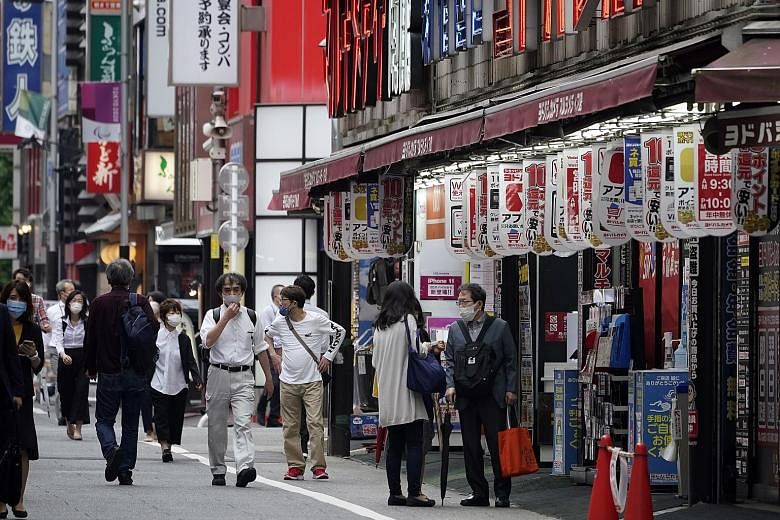TOKYO • Japan's economy shrank more than expected during the first three months of this year, raising the possibility of a double-dip recession as the country struggles to contain infections and speed up its Covid-19 vaccine roll-out.
Gross domestic product (GDP) contracted an annualised 5.1 per cent from the previous quarter, ending six months of double-digit growth, as businesses cut investment, shoppers held back spending and government outlays fell amid a suspension of a travel-promotion campaign to help the ailing tourism industry.
Economists had forecast an overall contraction of 4.5 per cent.
The worse-than-expected result leaves the economy in a vulnerable position this quarter, as Prime Minister Yoshihide Suga's administration struggles to find the right balance in a targeted approach to virus containment that attempts to limit damage to the economy and keep the staging of the Olympics on track.
"If the state of emergency is extended, that will certainly raise the odds of a contraction," economist Yoshiki Shinke of Dai-Ichi Life Research Institute said. "Consumer spending is the biggest missing piece for the economy and it's hard to predict because it's very much dependent on the virus situation."
Mr Suga last week added three more prefectures to the latest emergency, putting about half of the economy under restrictions that are slightly tighter than the ones in winter, but still less draconian than Europe's lockdowns.
Restaurants and bars in the biggest cities are now being asked to refrain from serving alcohol in addition to closing early.
Failure to end the restrictions at the end of this month and avoid a slip back into recession would pile pressure on Mr Suga to take extra action to right the economy and maintain his hopes of surviving as premier as the country heads into a general election that must be held by autumn.
Inability to peg back infections could also fuel concern over the staging of the Tokyo Olympics. Cancelling the Games would deal another blow to the economy.
"The government may end up putting together an extra budget to change the situation," economist Hiroaki Muto of Sumitomo Life Insurance said. "They may not be able to compile a big one, but they might pull together about 20 trillion yen (S$244 billion) of measures."
Additional spending would add to extra budgets worth over 70 trillion yen to deal with the virus and support the economy last year.
The first-quarter drop in capital investment signals that companies are more cautious about the outlook than earlier expected. Though the preliminary data is often heavily revised, business executives have started to voice concern over what they see as an unacceptably slow vaccine roll-out in one of the world's richest countries.
Still, strong exports and industrial production, supported by the global recovery, continue to provide a bedrock of support for Japan's economy, even though a rise in imports caused the overall trade component of the GDP to go negative in the first quarter.
"Once the virus situation starts to be more contained and people's activity becomes more normalised, pent-up demand is likely to emerge," Economy Minister Yasutoshi Nishimura said.
But rising infection numbers indicate that the government has not got the balance of its measures right, and the logic of holding the Olympics is called into question. An Asahi Shimbun newspaper poll on Monday showed that more than 80 per cent of respondents were against staging the Games this year.
Until earlier this year, Japan was seen as a relatively successful example of virus control. But the positive optics have changed, owing to the country's lengthy vaccine approval process and its slow roll-out of inoculation. So far, only about 3 per cent of Japan's population has received at least one dose of Covid-19 vaccine.
"The best economic measure is to accelerate vaccination," said Mr Shinke. "While many other countries consider loosening restrictions, Japan isn't there yet."
BLOOMBERG

